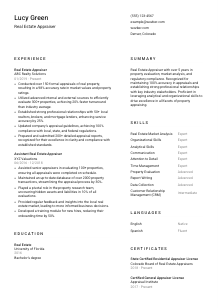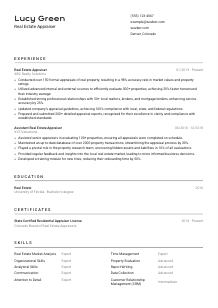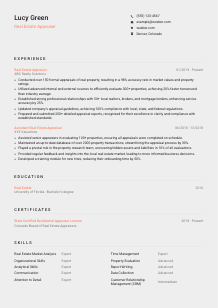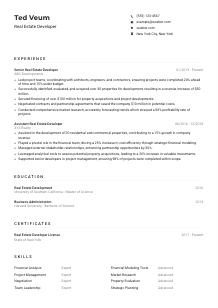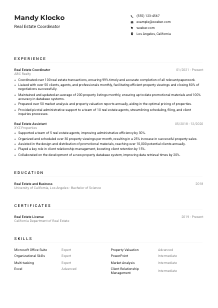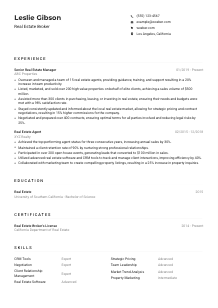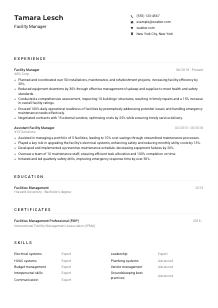Real Estate Appraiser Resume Example
Evaluating estates, but your resume doesn't reflect your worth? Navigate through this Real Estate Appraiser resume example, assembled using Wozber free resume builder. Discover how to calibrate your valuation expertise and industry knowledge to sync with job essentials, positioning your professional profile at the market peak where it belongs!
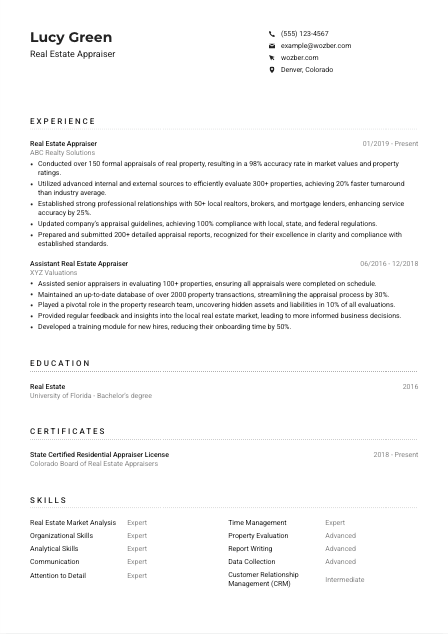
How to write a Real Estate Appraiser resume?
Embark on a journey tailor-made for you, the aspiring Real Estate Appraiser. In an industry where precision and expertise are valued above all, your resume is your first property to appraise. With the guidance of Wozber's free resume builder, including its ATS-friendly resume templates and ATS resume scanner, you're about to create a document that not only aligns perfectly with the job description but does so in a manner that's both engaging and authentic to the profession. Let's unlock the secrets to a resume that opens doors to your dream career!
Personal Details
Like the cornerstone of a property foundation, your Personal Details section grounds your resume in the essential. Here's how to craft this section with the precision of a seasoned Real Estate Appraiser.
1. Name as Your Brand
Imagine your name in bold letters on a property evaluation report. That's the impact you want it to have on your resume. Opt for clarity and distinction, and don't hesitate to make it prominent.
2. Title Matters
Just as "State Certified Residential Appraiser" conveys more authority than simply "Appraiser," aligning your title directly below your name—"Real Estate Appraiser"—instantly clarifies your professional domain to hiring managers.
3. Seamless Communication
Your phone number and a professional email address are your contact channels. Verify their correctness like you would analyze data for a property's market valuation. Inaccuracy here is as costful as in your appraisals.
4. Location, Location, Location
Just as proximity to Denver, Colorado, was highlighted in the job description to avoid relocation issues, include your current city and state to demonstrate your readiness and geographical desirability.
5. Digital Footprint
A professional LinkedIn profile or a personal website can serve as an extensive portfolio of your appraisal work and achievements. Ensure it's as polished and detailed as the appraisals you conduct.
Takeaway
Treat the Personal Details section with the same meticulous attention as the first impression of a property. It's your brand, your professional declaration, and the initiation of a dialogue with potential employers. Ensure it resonates with clarity, professionalism, and alignment with the Real Estate Appraiser role.





Experience
In Real Estate Appraisal, it's all about the portfolio you've built. The Experience section of your resume serves a similar purpose, showcasing the properties (roles) you've masterfully appraised (performed) throughout your career.
- Conducted over 150 formal appraisals of real property, resulting in a 98% accuracy rate in market values and property ratings.
- Utilized advanced internal and external sources to efficiently evaluate 300+ properties, achieving 20% faster turnaround than industry average.
- Established strong professional relationships with 50+ local realtors, brokers, and mortgage lenders, enhancing service accuracy by 25%.
- Updated company’s appraisal guidelines, achieving 100% compliance with local, state, and federal regulations.
- Prepared and submitted 200+ detailed appraisal reports, recognized for their excellence in clarity and compliance with established standards.
- Assisted senior appraisers in evaluating 100+ properties, ensuring all appraisals were completed on schedule.
- Maintained an up‑to‑date database of over 2000 property transactions, streamlining the appraisal process by 30%.
- Played a pivotal role in the property research team, uncovering hidden assets and liabilities in 10% of all evaluations.
- Provided regular feedback and insights into the local real estate market, leading to more informed business decisions.
- Developed a training module for new hires, reducing their onboarding time by 50%.
1. Property Evaluation
Dive into the job description, identifying keywords and phrases like 'conduct formal appraisals' and 'maintain up-to-date knowledge.' These are your appraisal criteria for correlating your experience.
2. Framework of Success
List your roles and companies in reverse chronological order, mirroring the structure of a property portfolio. Each role should be a showcase, detailing how you've elevated the company's valuation in the real estate market.
3. Highlight Key Transactions
For each position, dial in on accomplishments that directly address the job requirements. Use phrases like 'Conducted over 150 formal appraisals,' to demonstrate not just activity, but achievement and impact.
4. Quantify Your Market Impact
Numbers in real estate speak volumes. Apply the same logic to your resume by quantifying your achievements, such as 'Enhancing service accuracy by 25%.' It gives a tangible measure of your expertise and success.
5. Relevant Property Types Only
Showcase experience that aligns with the real estate appraiser role, focusing on tasks and achievements directly related to appraisal, market analysis, and compliance. Stray experience dilutes your expertise.
Takeaway
Treat this section as your professional property portfolio, highlighting the 'properties' (roles) you've elevated with your expertise. Each bullet point is an opportunity to demonstrate your profound impact on the real estate market. Let your Experience speak to your expertise, one appraisal (role) at a time.
Education
Education in the Real Estate Appraisal field sets the groundwork for your expertise, much like the foundation of a sturdy building. Here's how to solidify this part of your resume.
1. Degree Precision
Reflect the 'Bachelor's degree in Real Estate' or similar, as specified in the job description. This clearly showcases your relevant educational background, aligning perfectly with job requirements.
2. Blueprint of Your Learning
Present your educational achievements in a straightforward format: degree first, followed by the field of study, institution name, and graduation date. It's the blueprint to your academic foundation.
3. Relevant Coursework
In cases where your degree is directly related to the job, further detailing with relevant coursework might not be necessary. However, mentioning major projects or research in the field can add value.
4. Educational Milestones
Accolades such as cum laude or involvement in real estate clubs or associations demonstrate dedication and excellence in your field. Include these, especially if you are in the early stages of your career.
5. Continuous Learning
Even if not central to this section, mentioning ongoing education or certifications related to real estate appraisal can show a commitment to staying up-to-date in this ever-evolving field.
Takeaway
Your educational background in Real Estate or a related field forms the bedrock of your appraisal expertise. Highlight it effectively, showcasing your specific qualifications and any additional learning that reinforces your aptitude for this career path.
Certificates
In the realm of Real Estate Appraisal, certain certifications speak volumes about your expertise and dedication to the profession. Let's navigate through incorporating these into your resume.
1. Certificates as Prerequisites
Identify essential certifications like 'State Certified Residential Appraiser License,' pinpointed in the job description. These are non-negotiables, showcasing your legal qualification for the role.
2. Selection of Qualifications
List the most relevant and recent certifications, especially those explicitly required or highly valued in your profession. This concise approach ensures the hiring manager immediately recognizes your qualification.
3. Validity Dates Matter
Include the acquisition or expiration dates for certifications where relevance is time-sensitive, such as the 'Certified General Appraiser License.' It showcases your credentials are current and valid.
4. Continuous Professional Development
The world of real estate is dynamic, and so should be your learning curve. Regularly seek out new certifications or renewal courses that enhance your appraisal skills and market knowledge.
Takeaway
Certificates in your resume are akin to the official stamps on property documents – they validate your competence and authority in the field. Highlight them, ensuring they are up-to-date and relevant to showcase your ongoing commitment to professional excellence.
Skills
The Skills section of your resume is like the toolbox of an experienced Real Estate Appraiser. Each skill is a tool, specifically chosen for its value in the appraisal process. Let's curate this section with precision.
1. Extracting Job-Specific Tools
Begin by dissecting the job description for explicit and implicit skills. Look for phrases like 'excellent analytical, organizational, and communication skills.' These are your guideposts.
2. Your Professional Tools
Select skills that match the job description and align with your expertise. For instance, mention 'Real Estate Market Analysis' and 'Report Writing' to directly mirror required competencies.
3. Organized Tool Rack
Keep your skills section streamlined and focused. Prioritize those directly related to the role, ensuring a clear, quick snapshot of your capabilities that aligns with the employer's needs.
Takeaway
This section is your professional showcase, bringing attention to your most valuable tools in the appraisal process. Tailor it to speak directly to the demands of the role, demonstrating that not only do you have the right tools, but you also know how to use them expertly.
Languages
In the diversifying field of Real Estate Appraisal, language proficiency can significantly enhance your ability to communicate with a broader clientele. Here's how to effectively present your linguistic abilities.
1. Language Requirements
The ability to communicate effectively in English was specified for this role. Place this at the forefront of your Languages section, emphasizing your proficiency.
2. Additional Linguistic Assets
Beyond the required language, list other languages you're proficient in. This not only shows versatility but also positions you as capable of handling diverse clients and contexts.
3. Clear Proficiency Levels
Accuracy in depicting your language skills is key. Utilize terms like 'Native' or 'Fluent' to provide a clear understanding of your proficiency, ensuring expectations are met.
4. Language as a Professional Tool
Consider the role's scope and the market it serves. In areas with a diverse population or for roles with a focus on international property, your additional languages could be a significant asset.
5. The Value of Understanding
View each language you speak as a tool for opening doors to new markets and opportunities, much like understanding unique property features allows for accurate valuation.
Takeaway
Your proficiency in languages enriches your professional palette, offering nuanced understanding and broader communication possibilities. Highlight this skill, considering it a bridge to more expansive professional territories in Real Estate Appraisal.
Summary
The Summary is where you encapsulate your value as a Real Estate Appraiser in a succinct, compelling manner. It's the enticing façade that invites further exploration into the 'property' that is your resume.
1. Core of the Appraisal
Start with a solid introduction, laying out your professional identity and experience. It's your handshake, showing confidence and readiness.
2. Highlighting Valuables
Identify essential requirements from the job description, such as 'excellent analytical and communication skills,' and blend these into your summary. It's about showcasing the most attractive features of the house.
3. Brevity is Key
Keep your summary focused and concise. Aim for impactful statements that encapsulate your professional essence. It's the curb appeal that makes someone want to explore further.
4. The Teaser
Think of the Summary as the listing photo – it should grab attention and make hiring managers want to 'view more.' Your career achievements, especially those that meet and exceed job requirements, are your best features.
Takeaway
Your Summary is the highlight reel of your professional career tailored to grab the attention of the hiring managers. It serves as a snapshot, enticing them to delve deeper into the 'property'—your entire resume. Craft it with care, reflecting your readiness for the Real Estate Appraiser role.
Launching Your Real Estate Appraiser Journey
With these insights and Wozber's free resume builder at your disposal, you're well-equipped to construct an ATS-compliant resume that not only meets the job requirements but showcases your unique value in the Real Estate Appraisal field. Your resume is more than a document; it's a testament to your professional journey and ambition. Refine it, infuse it with your expertise, and make it your launchpad to success. The market awaits your impact. Embark on your journey with confidence!

- Bachelor's degree in Business, Real Estate, Finance, or related field.
- Minimum of 3 years of experience in real estate appraisal or related field.
- Strong knowledge of local real estate market trends and pricing.
- State Certified Residential or General Appraiser License is required.
- Excellent analytical, organizational, and communication skills.
- Must be skilled in English for business communication.
- Must be located in or willing to relocate to Denver, Colorado.
- Conduct formal appraisals of real property or land before it is sold, mortgaged, taxed, insured, or developed.
- Evaluate properties to establish market values and property ratings using internal and external sources.
- Maintain up-to-date knowledge of local, state, and federal regulations affecting real estate valuations.
- Prepare and submit appraisal reports in compliance with established guidelines and standards.
- Establish and maintain professional relationships with local realtors, brokers, and mortgage lenders to facilitate accurate and timely services.





